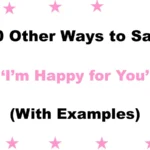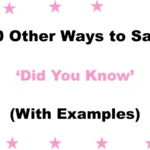When someone you care about is feeling under the weather, finding the right words to express your support can make all the difference. Saying “Get well soon” is classic, but sometimes it feels a bit generic or doesn’t fully capture your heartfelt wishes. That’s why having a variety of warm, thoughtful alternatives can help your message feel more personal and meaningful.
Whether you’re writing a card, sending a text, or speaking in person, these phrases can convey your care, hope, and encouragement in a way that truly resonates. In this article, we’ll explore 30 different ways to say “Get well soon” — with clear definitions, examples, and guidance on when to use each one. Let’s find the perfect phrase to brighten someone’s day and lift their spirits!
What Does “Get Well Soon” Mean?
“Get well soon” is a common expression used to wish someone a speedy recovery from illness or injury. It shows care and concern, hoping the person regains health quickly. While simple, it carries a warm intention, but sometimes people want to say it differently to sound more heartfelt or unique.
When to Use “Get Well Soon”
This phrase is best used when someone is sick, injured, or recovering from surgery. It’s appropriate for friends, family, colleagues, or acquaintances. You can use it in cards, messages, or spoken words. However, if you want to add a more personal touch or suit different contexts, alternative phrases may work better.
Is It Professional/Polite to Say “Get Well Soon”?
Yes, it is absolutely professional and polite to say “Get Well Soon” in most situations. It’s a kind, universally accepted expression of care and concern, whether you’re addressing a colleague, client, or friend. In formal settings,
you can pair it with phrases like “Wishing you a speedy recovery” to sound more polished. It shows empathy without overstepping boundaries, making it both thoughtful and respectful.
Pros and Cons of Saying “Get Well Soon”
Pros:
- Simple and clear
- Universally understood
- Friendly and positive
Cons:
- Can feel generic or impersonal
- May not suit all relationships or situations
- Lacks emotional depth in some cases
Synonyms for “Get Well Soon”
- Wishing You a Speedy Recovery
- Hope You Feel Better Each Day
- Sending Healing Thoughts Your Way
- May Your Strength Return Quickly
- Hoping You’re Back to Your Best Soon
- May You Recover Quickly and Fully
- Take Good Care of Yourself
- Wishing You Renewed Energy and Health
- May Your Healing Be Smooth and Steady
- Take Time to Rest and Heal
- Hoping for Your Speedy Recovery
- Wishing You a Rapid Return to Health
- May You Soon Feel Like Yourself Again
- Wishing You Peace and Healing
- Hope You’re Up and About Soon
- May Your Health Improve Day by Day
- Sending You Warm Wishes for Health
- Praying for Your Quick Recovery
- May You Be Back on Your Feet Soon
- Hope You Bounce Back Quickly
- Wishing You Strength and Wellness
- May Each Day Bring You More Strength
- Thinking of You and Wishing You Well
- Hoping Your Recovery is Smooth
- Get Stronger Every Day
- Wishing You Comfort and Healing
- May You Heal Faster Than Expected
- Hoping You Feel Stronger Every Morning
- Sending Lots of Positive Energy Your Way
- May Good Health Return to You Soon
1. Wishing You a Speedy Recovery
Definition: A hopeful phrase for quick healing.
Detailed Explanation: This classic phrase expresses a wish that the person’s recovery happens swiftly and without complications.
Scenario Example: “Wishing you a speedy recovery after your surgery!”
Best Use: Appropriate for both formal and informal messages.
Worst Use: May seem generic if repeated too often.
Tone: Positive, polite, supportive.
2. Hope You Feel Better Each Day
Definition: A gentle wish emphasizing gradual improvement.
Detailed Explanation: This phrase encourages patience and acknowledges that healing takes time, focusing on steady progress.
Scenario Example: “Hope you feel better each day as you rest and recover.”
Best Use: Long-term illness or slow recovery situations.
Worst Use: Less fitting for quick illnesses expecting immediate recovery.
Tone: Gentle, encouraging, patient.
3. Sending Healing Thoughts Your Way
Definition: An expression of emotional support from afar.
Detailed Explanation: It conveys that you are thinking kindly of the person’s health even if you can’t be physically present.
Scenario Example: “Sending healing thoughts your way during this tough time.”
Best Use: When distance prevents in-person support.
Worst Use: Can feel impersonal if overused with close friends.
Tone: Thoughtful, caring, distant but warm.
4. May Your Strength Return Quickly
Definition: A wish for regaining physical power.
Detailed Explanation: This phrase focuses on the physical toll illness takes and expresses hope for a swift return of energy and vitality.
Scenario Example: “May your strength return quickly after your illness.”
Best Use: Suitable for injuries or fatigue-related conditions.
Worst Use: Not ideal for purely emotional or mild ailments.
Tone: Supportive, optimistic, strong.
5. Hoping You’re Back to Your Best Soon
Definition: An optimistic phrase about returning to normal health.
Detailed Explanation: This phrase encourages looking forward to the person regaining their usual self, both in health and spirit.
Scenario Example: “Hoping you’re back to your best soon—we miss you at work!”
Best Use: Informal and friendly settings.
Worst Use: Might pressure someone who needs more time.
Tone: Warm, friendly, upbeat.
6. May You Recover Quickly and Fully
Definition: A formal wish for fast and complete healing.
Detailed Explanation: This conveys a desire for thorough recovery without lasting effects.
Scenario Example: “May you recover quickly and fully from your illness.”
Best Use: Formal cards, professional notes.
Worst Use: Can feel distant in close relationships.
Tone: Formal, respectful, sincere.
7. Take Good Care of Yourself
Definition: A caring reminder to prioritize self-care.
Detailed Explanation: More than just wishing well, this encourages the person to look after their health actively.
Scenario Example: “Take good care of yourself—your health is the priority now.”
Best Use: Close friends and family.
Worst Use: Could seem direct in formal situations.
Tone: Affectionate, caring, gentle.
8. Wishing You Renewed Energy and Health
Definition: A positive wish for regaining vitality.
Detailed Explanation: This focuses on both health and the energetic feeling that comes with it.
Scenario Example: “Wishing you renewed energy and health after your treatment.”
Best Use: Chronic illness or fatigue.
Worst Use: Too optimistic for severe cases.
Tone: Hopeful, warm, encouraging.
9. May Your Healing Be Smooth and Steady
Definition: A wish for uncomplicated, consistent recovery.
Detailed Explanation: This expresses hope that the healing process has no setbacks.
Scenario Example: “May your healing be smooth and steady in the days ahead.”
Best Use: Serious or long-term recoveries.
Worst Use: Overly cautious for minor illnesses.
Tone: Calm, reassuring, thoughtful.
10. Take Time to Rest and Heal
Definition: Encouragement to allow rest as part of healing.
Detailed Explanation: Emphasizes that healing requires rest and patience.
Scenario Example: “Take time to rest and heal—you deserve it.”
Best Use: For people prone to overworking despite illness.
Worst Use: Unnecessary for mild conditions.
Tone: Supportive, patient, caring.
11. Hoping for Your Speedy Recovery
Definition: Expressing hope that healing happens quickly.
Detailed Explanation: Similar to “Wishing you a speedy recovery,” this phrase highlights the desire for the person to regain health soon.
Scenario Example: “Hoping for your speedy recovery after the flu.”
Best Use: Casual and formal situations alike.
Worst Use: May sound repetitive if overused.
Tone: Warm, hopeful, polite.
12. Wishing You a Rapid Return to Health
Definition: A formal wish for quick restoration of well-being.
Detailed Explanation: This phrase emphasizes a swift comeback to full health, often suitable for professional or formal messages.
Scenario Example: “Wishing you a rapid return to health after your procedure.”
Best Use: Formal contexts like workplace or acquaintances.
Worst Use: Too formal for close family or friends.
Tone: Respectful, sincere, formal.
13. May You Soon Feel Like Yourself Again
Definition: A heartfelt wish for regaining one’s usual vitality.
Detailed Explanation: This phrase acknowledges how illness can make someone feel unlike themselves and wishes for their normal state to return soon.
Scenario Example: “May you soon feel like yourself again after all this.”
Best Use: Close friends and family.
Worst Use: Less fitting in very formal settings.
Tone: Caring, empathetic, intimate.
14. Wishing You Peace and Healing
Definition: A gentle wish for emotional and physical wellness.
Detailed Explanation: Combines hopes for both calmness and recovery, acknowledging the emotional toll of illness.
Scenario Example: “Wishing you peace and healing through this difficult time.”
Best Use: Serious or long-term illnesses.
Worst Use: Might feel too deep for mild sickness.
Tone: Compassionate, soothing, sincere.
15. Hope You’re Up and About Soon
Definition: A casual wish for returning to normal activity.
Detailed Explanation: Expresses a hopeful message that the person will soon be active again.
Scenario Example: “Hope you’re up and about soon—everyone misses you!”
Best Use: Informal, friendly contexts.
Worst Use: Could be pressuring if recovery takes longer.
Tone: Friendly, upbeat, informal.
16. May Your Health Improve Day by Day
Definition: A wish emphasizing steady, incremental healing.
Detailed Explanation: Focuses on daily progress rather than immediate recovery.
Scenario Example: “May your health improve day by day with lots of rest.”
Best Use: Long recoveries or chronic illnesses.
Worst Use: Not suitable for acute, quick illnesses.
Tone: Patient, encouraging, calm.
17. Sending You Warm Wishes for Health
Definition: A heartfelt expression of good health wishes.
Detailed Explanation: Offers warm, positive energy toward the person’s well-being.
Scenario Example: “Sending you warm wishes for health and happiness.”
Best Use: Cards, messages for all relationships.
Worst Use: May feel generic if overused.
Tone: Warm, positive, friendly.
18. Praying for Your Quick Recovery
Definition: A spiritual or religious expression of hope.
Detailed Explanation: Indicates that you are including the person in your prayers for fast healing.
Scenario Example: “Praying for your quick recovery and strength.”
Best Use: When both sender and receiver are comfortable with religious sentiment.
Worst Use: Unsuitable for secular or unknown beliefs.
Tone: Respectful, spiritual, hopeful.
19. May You Be Back on Your Feet Soon
Definition: A hopeful phrase focusing on physical recovery.
Detailed Explanation: Suggests returning to normal mobility and independence soon.
Scenario Example: “May you be back on your feet soon after your injury.”
Best Use: Injuries or mobility-related illnesses.
Worst Use: Not ideal for emotional or mental health issues.
Tone: Supportive, optimistic, straightforward.
20. Hope You Bounce Back Quickly
Definition: A casual, energetic wish for fast recovery.
Detailed Explanation: Informal phrase implying resilience and quick return to strength.
Scenario Example: “Hope you bounce back quickly from your cold!”
Best Use: Close friends, informal contexts.
Worst Use: Too casual for formal or serious illnesses.
Tone: Playful, friendly, upbeat.
21. Wishing You Strength and Wellness
Definition: A balanced wish for both mental and physical health.
Detailed Explanation: Combines hopes for physical recovery and emotional resilience.
Scenario Example: “Wishing you strength and wellness throughout your recovery.”
Best Use: Serious illnesses or stressful recoveries.
Worst Use: Less fitting for minor ailments.
Tone: Serious, encouraging, empathetic.
22. May Each Day Bring You More Strength
Definition: Focuses on gradual strengthening over time.
Detailed Explanation: Encourages hope for steady improvement and regaining energy.
Scenario Example: “May each day bring you more strength and hope.”
Best Use: Long recoveries or chronic conditions.
Worst Use: Too slow for quick illnesses.
Tone: Patient, hopeful, soothing.
23. Thinking of You and Wishing You Well
Definition: General expression of care and concern.
Detailed Explanation: Conveys that the person is in your thoughts along with wishes for health.
Scenario Example: “Thinking of you and wishing you well during your recovery.”
Best Use: When unsure what else to say.
Worst Use: Can feel vague or distant.
Tone: Polite, caring, neutral.
24. Hoping Your Recovery Is Smooth
Definition: A wish for an uncomplicated healing process.
Detailed Explanation: Emphasizes the hope that recovery proceeds without setbacks.
Scenario Example: “Hoping your recovery is smooth and trouble-free.”
Best Use: Serious illnesses or surgeries.
Worst Use: Overly cautious for minor illnesses.
Tone: Calm, reassuring, supportive.
25. Get Stronger Every Day
Definition: Encouragement to gain strength progressively.
Detailed Explanation: Motivates the person to improve steadily.
Scenario Example: “Get stronger every day—you’ve got this!”
Best Use: Friendly, supportive contexts.
Worst Use: May feel demanding if recovery is slow.
Tone: Encouraging, energetic, positive.
26. Wishing You Comfort and Healing
Definition: A wish for relief from pain and recovery.
Detailed Explanation: Focuses on both easing discomfort and physical healing.
Scenario Example: “Wishing you comfort and healing in the days ahead.”
Best Use: For painful or serious conditions.
Worst Use: Less relevant for mild illnesses.
Tone: Gentle, compassionate, sincere.
27. May You Heal Faster Than Expected
Definition: A hopeful and optimistic wish for quick healing.
Detailed Explanation: Expresses hope that recovery happens sooner than anticipated.
Scenario Example: “May you heal faster than expected and feel great soon!”
Best Use: Encouraging optimism.
Worst Use: Could create unrealistic expectations.
Tone: Optimistic, cheerful, supportive.
28. Hoping You Feel Stronger Every Morning
Definition: A phrase emphasizing daily progress.
Detailed Explanation: Suggests incremental improvement with each new day.
Scenario Example: “Hoping you feel stronger every morning as you recover.”
Best Use: Long recovery periods or convalescence.
Worst Use: Not suited for acute, short-term illness.
Tone: Patient, caring, hopeful.
29. Sending Lots of Positive Energy Your Way
Definition: An uplifting, energetic expression of support.
Detailed Explanation: Implies sending good vibes and encouragement from afar.
Scenario Example: “Sending lots of positive energy your way—get well soon!”
Best Use: Informal, friendly situations.
Worst Use: Can feel superficial in serious illness.
Tone: Cheerful, energetic, informal.
30. May Good Health Return to You Soon
Definition: A formal and hopeful wish for regaining health.
Detailed Explanation: Conveys a sincere hope that the person’s health is restored quickly.
Scenario Example: “May good health return to you soon after your illness.”
Best Use: Formal cards and messages.
Worst Use: Too formal for casual conversations.
Tone: Respectful, sincere, formal.
Conclusion
Finding 30 other ways to say “Get well soon” equips you with a diverse set of phrases to express genuine care and warmth. Each alternative has its unique nuance — from formal to casual, optimistic to patient, or spiritual to practical. By choosing the phrase that best fits your relationship and the situation, you show that your message is thoughtful and personalized.
Whether you want to sound encouraging, soothing, or simply supportive, these alternatives help your words truly resonate and uplift those who need it most. Remember, heartfelt wishes can make a big difference in someone’s healing journey.
FAQs
Q1: What does “Get Well Soon” really mean?
Get Well Soon” is a common phrase used to express a wish for someone’s quick recovery from illness or injury. It shows care and concern, encouraging the person to regain health as soon as possible.
Q2: When is it appropriate to use “Get Well Soon”?
It’s appropriate to use “Get Well Soon” anytime someone is sick, recovering from surgery, or facing health challenges. It works well for friends, family, colleagues, and acquaintances.
Q3: Are there more meaningful ways to say “Get Well Soon”?
Yes! Using alternative phrases tailored to the person’s situation or your relationship can make your message feel more personal and heartfelt. For example, “Wishing you strength and wellness” may suit someone with a longer recovery.
Q4: Is “Get Well Soon” professional enough for workplace messages?
Yes, it is professional and polite. However, if you want a more formal tone, phrases like “Wishing you a speedy recovery” or “May good health return to you soon” can sound more polished.
Q5: Can “Get Well Soon” sound insensitive?
Usually, it is kind and considerate. But if someone is dealing with a serious or chronic illness, a more empathetic or gentle phrase like “Wishing you peace and healing” might feel more appropriate.
Q6: How can I make my “Get Well Soon” message stand out?
Personalize your message by mentioning something specific about the person or their situation. Adding warmth and sincerity makes your words more meaningful. Using one of the alternative phrases can also help.

Mariah Cannon is a dedicated Senior Content Specialist at GrammarPeaks, known for her clear, engaging writing and deep knowledge of English grammar and usage. With a background in linguistics and years of experience in content development, Mariah crafts informative and accessible articles that empower readers to master the nuances of the English language. Her work reflects a commitment to clarity, education, and helping others express themselves with confidence.





